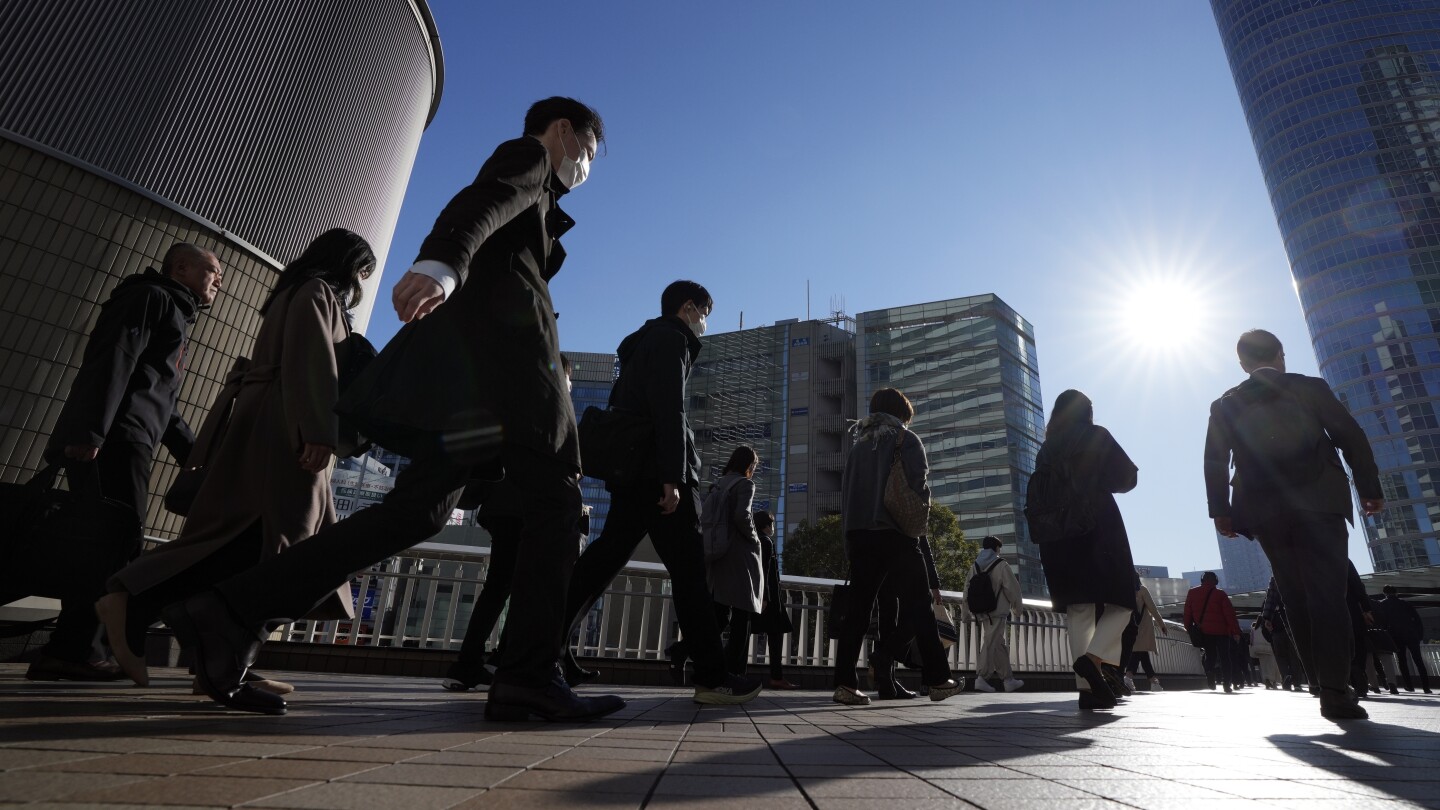Japan, a nation so hardworking its language has a term for literally working oneself to death, is trying to address a worrisome labor shortage by coaxing more people and companies to adopt four-day workweeks.
The Japanese government first expressed support for a shorter working week in 2021, after lawmakers endorsed the idea. The concept has been slow to catch on, however; about 8% of companies in Japan allow employees to take three or more days off per week, while 7% give their workers the legally mandated one day off, according to the Ministry of Health, Labor and Welfare.
Hoping to produce more takers, especially among small and medium-sized businesses, the government launched a “work style reform” campaign that promotes shorter hours and other flexible arrangements along with overtime limits and paid annual leave. The labor ministry recently started offering free consulting, grants and a growing library of success stories as further motivation.
“By realizing a society in which workers can choose from a variety of working styles based on their circumstances, we aim to create a virtuous cycle of growth and distribution and enable each and every worker to have a better outlook for the future,” states a ministry website about the “hatarakikata kaikaku” campaign, which translates to “innovating how we work.”
a nation so hardworking…
Or hardly working given how backwards and out of date the work culture is, but sure let’s make this out to be the fault of employees who are likely overworking due to low pay. An extra day off isn’t going to fix the systemic cultural issues, class discrimination, xenophobia… the list could go on and on.
Calling this innovative when Japan has yet to modernize its business practices, or admitting it’s an issue, is disingenuous at best.
It always surprised me that the country that pioneered Lean production techniques has always had such an enormous waste of labour resources in their office culture.
They have one of the lowest GDP per hour worked of all Industrial nations.
Italy, Spain and Germany have way higher labour productivity, while even Turkey edges out Japan.
Also, it’s established practice for workers to stagger their off days across the week.
This way both the company and things like services, banks, stores etc. can be available 7 days a week without any undue pressure.
So they’re already well positioned to take advantage of flexible working time.
Associated Press - News Source Context (Click to view Full Report)
Information for Associated Press:
MBFC: Left-Center - Credibility: High - Factual Reporting: High - United States of America
Wikipedia about this sourceSearch topics on Ground.News
https://apnews.com/article/japan-4day-work-week-campaign-f78a95a89d99e7b323f7554721088d66
Was listening to an interview with NY Governor on imposing cell phone ban in schools. Said if they left it to individual schools or school districts, there would be lots of pressure from parents or individual groups not to do it and the whole thing would fail. And if they made it voluntary, some kids would comply, but there would be social pressure to keep things as-is, due to FOMO.
Instead, the government would pass a uniform, mandatory law and take the heat.
Seems like that’s what will be needed to change everyone to a 4x8 week. Similar dynamic. Do, not ask.
That sounds like classic Game Theory. Nobody’s going to do it because it a few don’t they have an advantage, except when it’s forced from above changing the playing field.
But will they feel safe to use it? I feel like they tried this with time off, but workers felt like they couldn’t use it without repercussions to their career and work social life.
4-day week seems overwhelmingly positive for all parties. Why is it so slow to catch on?
What are managers going to do the fifth day, stay with their family ?!!
Managers have time bombed agendas and think everyone else have too.
If I had to guess, it’s probably because the entities in charge of these changes are very old and very stuck in their ways.
So-called risks taking executives/business people when they could take a risk to benefit their employees without hurting their bottom line (and possibly even increasing it):
I’m going to guess it’s the same origin as “the cruelty is the point”. Some people just don’t want other people to be happy.
Also some people aren’t fact driven. Working fewer days feels like it should be less productive, so it must be.
Work only lose 20% of my time, but I gain 50% free time.
I punch those numbers into my calculator, it makes a happy face.
Because, of control, power, and because many of the older generation seem the think that if they had to suffer in some specific way, then it’s their duty to pass that same suffering on to the next generation.
It’s not about what is better for both parties, it’s about control. Leadership and the 1% want to keep us in line. If they relent and give us a better work/life balance, what’s next? Raises that match inflation? Better benefits?
Just had read this: Workers in Japan can’t quit their jobs. They hire resignation experts to help
Despite laws, mind you.Woah, how are there not the bloody remains of the bosses strung across the streets? That would happen to me once, then I would be in literal prison. Seems like a nicer place than THAT anyway.
legally mandated one day off
As a french : what the fuck, Japan ?
Well, that would be one way to encourage young folks to have more babies and turn around Japans low birth rate. More time to actually spend in relationships with someone other than your coworkers would be a good step in the right direction.
So they want to reduce the week from 7 to 4 days a week? ;-D
Having lived and worked for many years in both Europe and the US, the US has the absolute worst work-life balance and labor regulations I’ve ever experienced in my life. Japan makes the US look like a kindergarten.
Sometimes cultures have really toxic ideas on them. Probably all cultures have something. Like in the US there’s a lot of “the only emotion men are allowed is anger”, for example.
How do you fix that? Is there a general solution? Because sometimes it’s like enforced by the very people it’s harming.
But it’s all social. Made up. It’s not like physics. We can’t all decide that acceleration due to gravity on earth is now a nice round 10 m/s². But we could just decide working long hours is bullshit.
This might be philosophical, but I think a lot of people make a mistake, when they assume that just because something is made up, it somehow makes that thing less real, and less of an obstacle to overcome. The quality of being made up says something about a thing’s origin, not about its level of realness.
As stated, that notion might be philosophical, but following it’s own rules, that doesn’t impact the degree to which it, as with any other idea, exists as a thing that has the quality of realness (distinct from truth value) to it.
Well, it probably says something that I read about this here rather than getting it from my company, heh. That said, we are fully remote and flex time for at least a lot of the engineering side.








